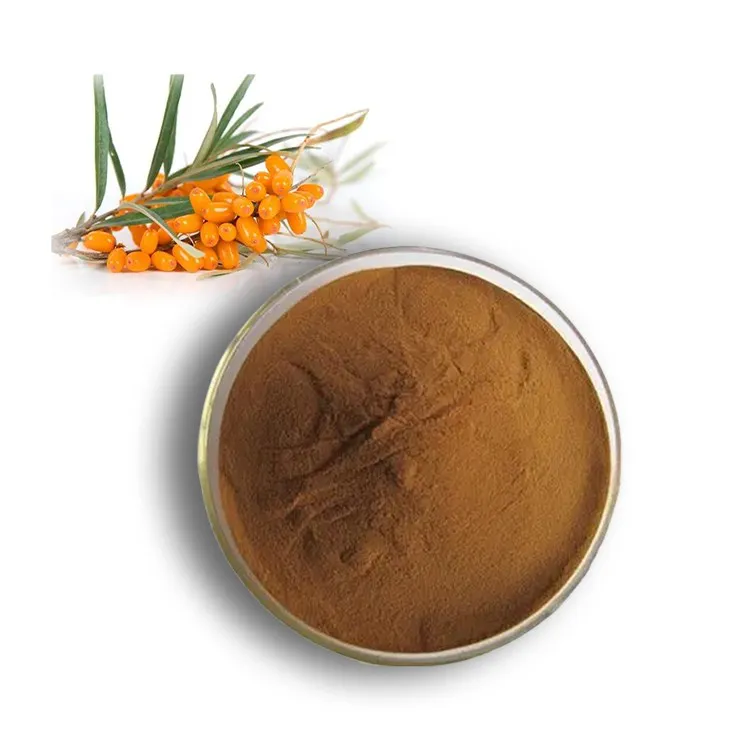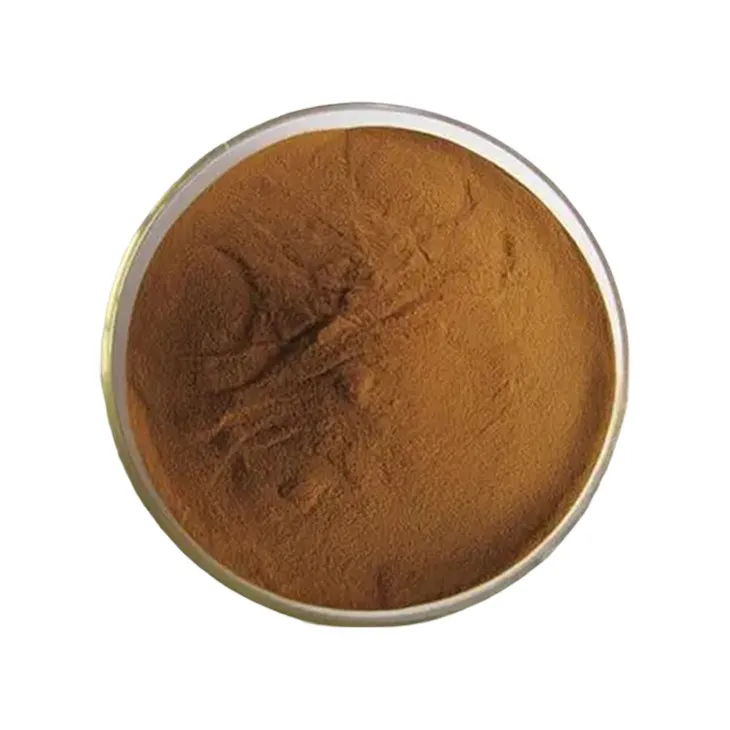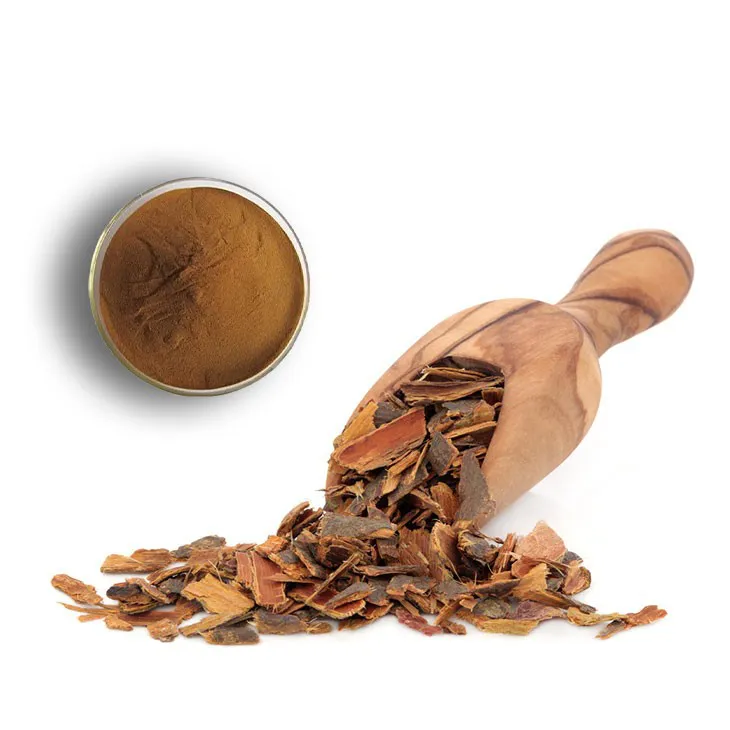- 0086-571-85302990
- sales@greenskybio.com
Seabuckthorn Bark Extract: Is the Extract Effective for Weight Loss?
2024-11-13

1. Introduction
In recent years, the pursuit of natural remedies for weight loss has been on the rise. SeaBuckthorn bark extract has emerged as a potential candidate in this regard. This extract has a long history of traditional use in some cultures, but its role in modern weight - loss regimens is still being explored. Understanding whether it can truly contribute to weight loss requires a comprehensive examination of various aspects, including its origin, traditional uses, and scientific evidence.

2. Origin and Traditional Uses
Seabuckthorn (Hippophae rhamnoides) is a deciduous shrub native to regions in Asia and Europe. It has been used for centuries in traditional medicine systems.
2.1 In Asian Traditional Medicine
In traditional Asian medicine, seabuckthorn has been used to treat a variety of ailments. For example, it was often used to improve digestion. Good digestion is indirectly related to weight management, as a well - functioning digestive system can help the body process nutrients more efficiently. It was also used to boost the immune system, which is important for overall health during the process of any dietary or lifestyle change aimed at weight loss.
2.2 In European Traditional Medicine
In European traditional medicine, seabuckthorn was valued for its potential to heal wounds and improve skin health. While these uses may not seem directly related to weight loss, they indicate the plant's overall beneficial properties for the body. A healthy body is more likely to respond positively to efforts related to weight management.

3. Modern Scientific Studies on Anti - Obesity Properties
With the growing interest in seaBuckthorn bark extract's potential for weight loss, modern scientific research has started to investigate its anti - obesity properties.
3.1 Laboratory Studies
Some laboratory studies have focused on the bioactive compounds present in seaBuckthorn bark extract. For instance, it contains flavonoids, which have been shown in some in - vitro studies to have antioxidant and anti - inflammatory properties. These properties could potentially play a role in weight loss. Antioxidants can help reduce oxidative stress in the body, which may be associated with obesity - related metabolic disorders. Anti - inflammatory effects can also contribute to a healthier metabolic environment, as chronic inflammation is often linked to obesity.
Another area of study is the extract's effect on lipid metabolism. Preliminary laboratory experiments suggest that seabuckthorn bark extract may influence the way the body processes fats. It could potentially increase the breakdown of fats (lipolysis) and reduce the synthesis of new fats (lipogenesis). However, these findings are still in the early stages and need further in - vivo confirmation.
3.2 Animal Studies
Animal studies have provided some insights into the potential weight - loss effects of seabuckthorn bark extract. In some rodent models of obesity, animals fed with diets containing seabuckthorn bark extract showed a reduction in body weight gain compared to those on a control diet. This reduction was often accompanied by changes in body composition, such as a decrease in adipose tissue mass.
One possible mechanism observed in animal studies is the impact on appetite regulation. Seabuckthorn bark extract may affect the hormones and neural pathways involved in appetite control. For example, it could potentially increase the release of satiety hormones, making the animals feel full and thus reducing their food intake. However, it is important to note that the physiological and metabolic processes in animals may not be exactly the same as in humans, so these results cannot be directly extrapolated to humans.

4. Absorption in the Body
Understanding how seabuckthorn bark extract is absorbed in the body is crucial for determining its effectiveness in weight loss.
4.1 Digestive Absorption
When consumed, the extract has to pass through the digestive system. The bioactive compounds in the extract need to be released from their matrix and then absorbed across the intestinal wall. Factors such as the form of the extract (e.g., powder, capsule, or liquid) and the presence of other food components can influence its absorption. For example, if the extract is consumed with a high - fat meal, it may be absorbed differently compared to when it is consumed on an empty stomach.
4.2 Bioavailability
Bioavailability refers to the proportion of the ingested extract that actually reaches the systemic circulation and is available to exert its biological effects. Seabuckthorn bark extract may have limited bioavailability due to factors such as poor solubility or first - pass metabolism in the liver. Low bioavailability could potentially limit its effectiveness in promoting weight loss, as only a small fraction of the ingested extract may be able to interact with the target tissues and mechanisms involved in weight regulation.

5. Long - Term Effects on Body Weight
While short - term effects of seabuckthorn bark extract on body weight are of interest, long - term effects are equally important, especially for sustainable weight loss.
5.1 Maintenance of Weight Loss
One aspect of long - term weight management is the ability to maintain the weight loss achieved. In theory, if seabuckthorn bark extract affects the body's metabolic processes in a way that promotes fat loss, it should also help in preventing weight regain. However, there is currently a lack of long - term studies in humans to confirm this. Without such studies, it is difficult to determine whether the initial weight loss observed in short - term trials can be sustained over time.
5.2 Impact on Body Composition
Long - term use of the extract may also have an impact on body composition. It is possible that it not only reduces body fat but also has an effect on muscle mass. Maintaining muscle mass is important during weight loss, as muscle tissue is metabolically active and helps in burning calories at rest. If the extract causes excessive muscle loss along with fat loss, it may not be a desirable option for long - term weight management. Again, more research is needed to fully understand these potential long - term effects on body composition.
6. Safety Profile
Before considering seabuckthorn bark extract as a weight - loss option, its safety profile must be thoroughly evaluated.
6.1 Potential Side Effects
Some individuals may experience side effects when consuming seabuckthorn bark extract. These can include gastrointestinal symptoms such as nausea, diarrhea, or abdominal discomfort. The severity of these side effects may vary depending on factors such as the dose of the extract and individual sensitivity. In addition, there may be allergic reactions in some people who are sensitive to components of the seabuckthorn plant.
6.2 Interactions with Medications
Seabuckthorn bark extract may interact with certain medications. For example, if a person is taking medications for diabetes or blood pressure, the extract could potentially interfere with the effectiveness of these drugs or cause adverse effects. It is important for individuals on medications to consult their healthcare providers before starting to use seabuckthorn bark extract.
7. Conclusion
In conclusion, seabuckthorn bark extract shows some potential in the area of weight loss based on its traditional uses and emerging scientific evidence. However, there are still many uncertainties. The current scientific knowledge is limited, especially when it comes to long - term effects and safety in humans. While laboratory and animal studies suggest possible mechanisms for weight loss, more well - designed human trials are needed to confirm these findings. Additionally, the issues related to absorption and bioavailability need to be further addressed. Until more conclusive evidence is available, seabuckthorn bark extract cannot be firmly recommended as a reliable weight - loss option. It is important for individuals interested in using it for weight loss to approach it with caution and consult with healthcare professionals.
FAQ:
What is seabuckthorn bark extract?
Seabuckthorn bark extract is a substance derived from the bark of the seabuckthorn plant. It contains various bioactive compounds which may have different effects on the body.
How does seabuckthorn bark extract potentially affect weight loss?
Modern scientific studies suggest that seabuckthorn bark extract may have anti - obesity properties. Some of its components might interact with the body's metabolism, for example, by influencing fat metabolism or appetite regulation. However, more research is needed to fully understand the mechanisms.
Is seabuckthorn bark extract safe for consumption in relation to weight loss?
The safety profile of seabuckthorn bark extract is an important consideration. Currently, there is no evidence to suggest major harmful effects when used appropriately. But as with any supplement, it's crucial to follow recommended dosages. Some individuals may experience minor side effects such as digestive discomfort, but this varies from person to person.
How well is seabuckthorn bark extract absorbed in the body in relation to its potential weight - loss effects?
The absorption of seabuckthorn bark extract in the body can influence its effectiveness for weight loss. Absorption depends on various factors such as the form of the extract and the individual's digestive system. Some studies indicate that certain components of the extract are relatively well - absorbed, but more research is required to determine how this absorption specifically relates to its anti - obesity effects.
What are the long - term effects of seabuckthorn bark extract on body weight?
At present, there is limited information regarding the long - term effects of seabuckthorn bark extract on body weight. While short - term studies may show some promising results in terms of weight - related factors, long - term data is essential to establish its true efficacy and safety for sustainable weight loss.
Related literature
- The Potential of Seabuckthorn in Obesity Management: A Review"
- "Seabuckthorn Bark Extract: Chemical Composition and Health Implications"
- "Anti - Obesity Effects of Natural Extracts: Focus on Seabuckthorn Bark"
- ▶ Hesperidin
- ▶ citrus bioflavonoids
- ▶ plant extract
- ▶ lycopene
- ▶ Diosmin
- ▶ Grape seed extract
- ▶ Sea buckthorn Juice Powder
- ▶ Beetroot powder
- ▶ Hops Extract
- ▶ Artichoke Extract
- ▶ Reishi mushroom extract
- ▶ Astaxanthin
- ▶ Green Tea Extract
- ▶ Curcumin Extract
- ▶ Horse Chestnut Extract
- ▶ Other Problems
- ▶ Boswellia Serrata Extract
- ▶ Resveratrol Extract
- ▶ Marigold Extract
- ▶ Grape Leaf Extract
- ▶ blog3
- ▶ blog4
- ▶ blog5
-
Organic Tongkat Ali extract powder factory.
2024-11-13
-
How to make powder with ashwagandha extract.
2024-11-13
-
Rosehip extract manufacturers from China.
2024-11-13
-
The best cat's claw extract in nature.
2024-11-13
-
Chinese Dandelion Leaf Extract Suppliers.
2024-11-13
-
Black Garlic Extract
2024-11-13
-
Curcumin Extract
2024-11-13
-
Golden Seal Extract
2024-11-13
-
Kupilu Extract
2024-11-13
-
Bitter Melon Extract
2024-11-13
-
Citrus bioflavonoids
2024-11-13
-
Feverfew Extract
2024-11-13
-
Phellodendron Extract
2024-11-13
-
Polygonum multiflorum extract
2024-11-13
-
Aminolevulinic acid
2024-11-13





















